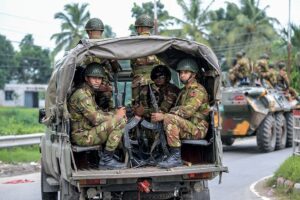Vlogger and commentator Pinaki Bhattacharjee’s latest proposal to grant a form of autonomy to the Chittagong Hill Tracts (CHT) is not just misguided — it is dangerously naïve. His reasoning rests on shallow historical references and flawed analogies that, if taken seriously, would imperil Bangladesh’s sovereignty and national cohesion. The CHT is a sensitive strategic frontier region, not an experimental zone for political romanticism.
Misreading History for Political Posturing
Mr Bhattacharjee’s attempt to use pre-1971 administrative arrangements as a justification for autonomy reflects a poor grasp of both history and statecraft. Bangladesh emerged through a painful war of liberation that redrew the political and legal framework of this land once and for all. Any selective appeal to the pre-1971 period ignores the fact that the CHT’s status was decisively settled within the sovereign boundaries of Bangladesh.
The 1997 CHT Peace Accord remains the legitimate and binding instrument governing the region’s future. It recognises the distinct identity of its peoples while keeping the CHT firmly within Bangladesh’s constitutional and administrative order. This delicate balance — local self-management without undermining sovereignty — was the product of decades of negotiation and bloodshed. Reopening that settlement through loose talk of “autonomy” risks undoing nearly three decades of painstaking progress.
The FATA Fallacy
Even more troubling is Mr Bhattacharjee’s comparison of the CHT to Pakistan’s former Federally Administered Tribal Areas (FATA) and the North-West Frontier Province (NWFP, now Khyber Pakhtunkhwa). Such an analogy is dangerously misplaced.
FATA was a colonial construct, governed under the Frontier Crimes Regulation, deliberately left semi-autonomous by the British to buffer Afghanistan. Its unique tribal and religious dynamics — combined with the Cold War’s legacy of foreign interference and militancy — made it a breeding ground for extremism. Pakistan’s eventual decision to merge FATA into Khyber Pakhtunkhwa was a reluctant move to fix an inherited problem, not a model of success.
To import that example into Bangladesh’s CHT is a profound error. The CHT does not share FATA’s geography, religious composition, or security environment. Bangladesh’s development and governance institutions already extend throughout the CHT — from roads and power grids to schools and administrative offices. The notion that the CHT needs FATA-style autonomy ignores this progress and instead risks creating precisely the kind of governance vacuum that breeds instability.
The Real Challenge: Armed Militancy and Lawlessness
The true obstacle to peace and prosperity in the CHT is not the absence of autonomy — it is the persistence of militancy, criminal networks, and armed groups that thrive in the shadows. Despite the 1997 Accord, violent factions continue to extort businesses, attack rival communities, and undermine confidence in state institutions.
Any suggestion that the government should weaken its control or devolve core security powers in this environment is reckless. National unity cannot coexist with armed separatism. Bangladesh has every right — and indeed an obligation — to enforce the rule of law across every inch of its territory. Peace and economic opportunity will return to the CHT only when terrorism and banditry are decisively dismantled.
Sovereignty Is Non-Negotiable
Bangladesh’s constitution recognises equality of all citizens. It also enshrines the indivisibility of the Republic. Genuine peace in the hills will not come from carving out special zones of privilege or pseudo-independence. It will come from faithful implementation of the Peace Accord, transparent land dispute resolution, economic empowerment, and equal protection under the law.
The path forward is not “autonomy,” but integration — strengthening civil administration, expanding education and health infrastructure, and ensuring that the benefits of development reach every community. The armed forces and law enforcement agencies must be supported, not second-guessed, in their mission to stabilise and secure the area.
Reckless Commentary Has Consequences
Mr Bhattacharjee’s proposal betrays either a severe misunderstanding of national security or the influence of advisers with their own questionable motives. Public figures with large audiences must exercise responsibility, particularly when discussing sensitive frontier regions where words can inflame tensions and embolden destabilising actors.
Loose talk of “self-rule” in the CHT risks emboldening the very militant elements who profit from chaos. Bangladesh’s enemies — both internal and external — would seize upon such rhetoric to sow division. This is not intellectual curiosity; it is strategic negligence.
The Bottom Line: Security First, Development Always
Not an inch of the Chittagong Hill Tracts will be surrendered — nor should it ever be. The responsibility of the state is to ensure that law and order prevail, that militants are disarmed, and that development continues unimpeded.
A secure and prosperous CHT strengthens Bangladesh’s territorial integrity and regional stability. Those who advocate autonomy without understanding its security implications risk undoing everything that generations of Bangladeshis — from soldiers to civil servants to local citizens — have built.
Lasting peace will not be found in naïve theories or borrowed templates. It will come through strong governance, decisive counter-militancy operations, and economic inclusion. The people of the CHT deserve development, dignity, and peace — not dangerous experiments in autonomy that would leave them hostage once again to violence and uncertainty.
Our proposal to the Bangladesh Army is to raise a new infantry division to ensure permanent security for the Khagrachari region, and redistribute the existing formations of the 24 Infantry Division to safeguard other hills regions and Chattogram.

M.Z. Rahman is a distinguished defence and aerospace industry veteran turned strategist, with over two decades of experience in regional security, military modernisation, and strategic policy. Holding a Master of Arts in International Relations and Security Studies from Waikato University, New Zealand, he has contributed extensively to leading think tanks and defence journals worldwide. As Chief Editor of BDMilitary, Rahman drives the editorial vision, delivering authoritative, rigorously researched insights that reflect the latest trends in defence and geopolitics. His work integrates industry expertise with strategic foresight, establishing him as a respected voice in global defence strategy.



